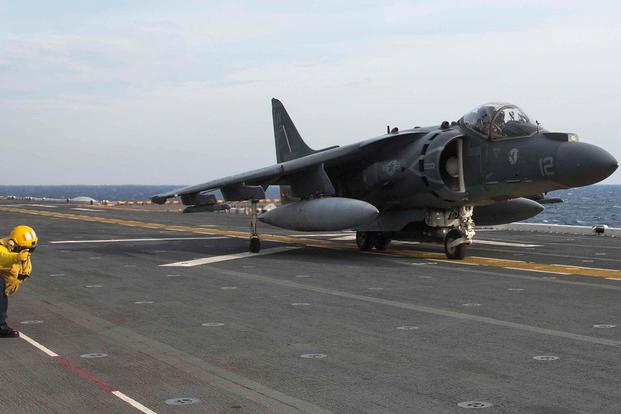An AV-8B Harrier aircraft operating aboard the USS Kearsarge in the Mediterranean was damaged earlier this month after a loose grounding wire was sucked into the plane's engine.
The incident occurred as the Harrier, with the 22nd Marine Expeditionary Unit based out of Camp Lejeune, North Carolina, was undergoing routine maintenance, according to Marine Corps spokesman Capt Christopher Harrison.
"No one was injured, and an investigation is underway in order to learn from the incident and prevent future occurrences," Harrison said of the Jan. 5 mishap.
The Naval Safety Center said it is considered a "Class A" mishap, defined as those involving fatalities, severe damage totaling $2 million or more, or a complete loss of the aircraft.
Related content:
- Marines Go Bump In The Night: Bad Driving a Flightline Hazard
- New 'Navy Sustainment System' Aims to Improve Aircraft Readiness
- Aviation Accident Spike Has Services Scrambling for Solutions
In recent months, the Marine Corps said it is planning new initiatives in sustainment, maintenance and training.
Lt. Gen. Steven Rudder, deputy commandant for aviation, said in October that adding defense industry engineers to work with sailors and Marines may be a simple way to close gaps in maintenance issues with some of "these complex systems."
He noted that 2017 wasn't a great year for Marine aviation and practices.
The number of Marine Corps aviation accidents rose nearly 80 percent between fiscal 2013 and fiscal 2017, according to a report from Military Times. Most of this increase came in the Class C category, non-fatal accidents sustaining between $50,000 and $500,000 in damage to the aircraft, Rudder said.
"We had a terrible year," he said of the 2017 increase. In 2018, he said, the service cut all classes of mishaps, A through C, in half.
"So we've actually had a great year," Rudder said in October, "but we're still concerned, making sure the pilots are trained. ... We want pilots to be proficient so they can react well to things that are unforeseen within aviation in the operating environment."
-- Oriana Pawlyk can be reached at oriana.pawlyk@military.com. Follow her on Twitter at @Oriana0214.












